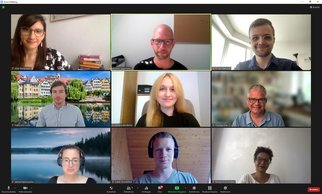The Project
In times of multiple crisis discourses, ranging from Brexit to the COVID-19 pandemic and climate change, institutions and member states of the European Union (EU) are increasingly emphasizing the EU’s role as a provider of security and protection for European citizens in uncertain times. ZUSE investigates whether, how and with what consequences such a novel guiding narrative for the organization of European solidarity and cohesion is emerging, displacing established concepts such as the *peace project” or the single market and extending beyond the construction and handling of specific security threats. We assume that this not only physical security from specific dangers is at stake here, but also “ontological security” in the sense of a clear and stable self-image in an environment which is perceived as insecure and uncertain.
ZUSE addresses three sets of questions:
- How, by whom and to what extent is “security” established as a guiding narrative for the organization of European solidarity in public discourse? Which conceptions of solidarity and security underpin these narratives? Which images of the self and others are expressed in this process?
- How is the relation between solidarity and security shaped specifically? In which interactions and practices is this reflected on different levels and how do different actors experience this relation in their everyday contexts?
- Which ambivalences and unintended consequences are associated with this? Where do we see exclusionary effects? And how could concepts of security that are prone to diversity look like?
The participating research institutions examine these guiding questions on three levels with distinct analytical and empirical focuses and from the perspectives of different disciplinary approaches. The findings of the sub-projects will finally be brought together in a cross-level comparison.
Political Level
On the level of political debates, we focus on the ways in which security and solidarity are constructed as interrelated in the European Parliament and the German Bundestag, but also in official documents and speeches by core actors within the European Commission and member states governments. We are particularly interested in how the meaning of security and solidarity has changed since the early 1990s, whether it varies between different policy fields, and whether particular understandings of security are linked to more open or closed conceptions of societal solidarity and thus to different mechanisms of inclusion and exclusion. This subproject is carried out by the team at the University of Tuebingen.
Administrative Level
On the administrative level, we investigate which overarching narratives of the EU as a security provider have prevailed in the recent past and present and how these translate into specific conceptions and interactions in the “engine room” of European integration. In addition to analysing official documents, we will primarily conduct interviews with administrative experts form the European Commission, the Council of the European Union, the European Parliament and the representations of member states, but also with representatives of think tanks and NGOs in Brussels. This sub-project is carried out by the Institute for Peace Research and Security Policy at the University of Hamburg.
Societal Level
In this part of ZUSE we focus on the relevance of security-related imaginaries of Europe in everyday contexts. We ask: in which social processes are imaginaries of »(in-)security« and togetherness produced? How do they articulate in everyday experiences? How do they change?
To answer these questions we look at an empirical field, which is particularly marked by conflicts between ideals of European solidarity and togetherness on the one hand, and European security interests on the other: places of first arrival in Europe for refugees from the Global South. In an asymetric multi-sited research design, we engage ethnographically with places in Europe’s topographical center (Rhine-Ruhr-Maas region in Germany, Belgium and the Netherlands) as well as it’s topographical periphery (Lesvos, Lampedusa and the Canary Islands). The subproject is conducted by the team at Helmut-Schmidt-University Hamburg.



